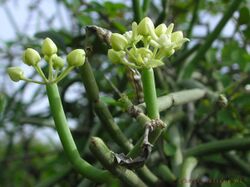Biology:Cynanchum acidum
| Cynanchum acidum | |
|---|---|

| |
| Cynanchum acidum | |
| Scientific classification | |
| Kingdom: | Plantae |
| Clade: | Tracheophytes |
| Clade: | Angiosperms |
| Clade: | Eudicots |
| Clade: | Asterids |
| Order: | Gentianales |
| Family: | Apocynaceae |
| Genus: | Cynanchum |
| Species: | C. acidum
|
| Binomial name | |
| Cynanchum acidum (Roxb.) Oken
| |
| Synonyms | |
| |
Cynanchum acidum is a species of flowering plant in the family Apocynaceae, typically found in the arid parts of peninsular[1] India where it is used in religious sacrifices. The plant is religiously linked to Hinduism and is believed to be a major ingredient of the Soma in Ancient India.[2]
Description
Cynanchum acidum is a perennial leafless, jointed shrub with green, cylindrical, fleshy glabrous with twining branches having milky white latex and with its leaves reduced to scales. Its flowers are white or pale greenish white, are fragrant and grow in umbels on branch extremities. The fruits follicles taper at both ends; seeds are flat, ovate, comose. This leafless plant grows in rocky, sterile places all over India.
Uses
As a beverage
The plant yields an abundance of a mildly acidulous milky juice, and travellers like nomadic cowherds suck its tender shoots to allay thirst. Traditional accounts hold that Cynanchum acidum is the Soma plant of the Vedas. The Rigveda, ix. says the purifying Soma, like the sea rolling its waves, has poured forth songs, hymns and thoughts.[3]
Medicinal
The plant is bitter, acrid, cooling, alterant, narcotic, emetic, antiviral, and rejuvenating.[citation needed]
India
In classical Indian medicine it is considered useful in vitiated conditions of pitta, dipsia, viral infection, hydrophobia, psychopathy and general debility.[4]
References
- ↑ "Vikaspedia Domains". https://vikaspedia.in/agriculture/crop-production/package-of-practices/medicinal-and-aromatic-plants/sarcostemma-acidum.
- ↑ Singh, N. P. (1988). Flora of Eastern Karnataka, Volume 1. Mittal Publications. p. 416. ISBN 9788170990673. https://books.google.com/books?id=6-g-nU3bTjcC&q=Soma&pg=PA416.
- ↑ Balfour, Edward (1885). The Cyclopædia of India and of Eastern and Southern Asia: Commercial, Industrial and Scientific, Products of the Mineral, Vegetable, and Animal Kingdoms, Useful Arts and Manufactures, Volume 3. Bernard Quaritch. p. 535. https://books.google.com/books?id=iU0OAAAAQAAJ&q=Sarcostemma+acidum&pg=PA535.
- ↑ Warrier, P. K.; Nambiar, V. P. K. (1993). Indian Medicinal Plants: A Compendium of 500 Species, Volume 5. Orient Blackswan. p. 73. ISBN 9788125007630. https://books.google.com/books?id=y3_vZIUVVj8C&q=Sarcostemma+acidum&pg=PA73.
External links
Wikidata ☰ {{{from}}} entry
 |

